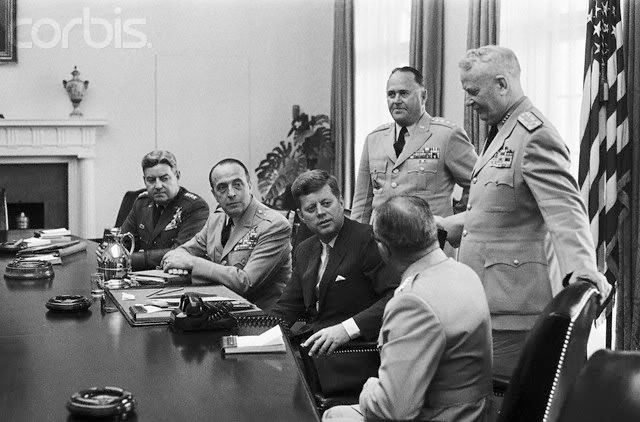
Lisa Pease reminds us what President Kennedy and President Roosevelt faced from Big Money and Great Power -- the spectre of treason.
JFK, FDR and 'Seven Days in May'By Lisa Pease
February 24, 2009
EXCERPT...
The film "Seven Days in May" began as a novel by Fletcher Knebel, inspired to a great degree by Knebel's conversations with Gen. Curtis LeMay, President Kennedy's contentious Air Force Chief of Staff who was furious at Kennedy for not sending in full military support during the Bay of Pigs incident.
Additionally, LeMay infamously argued during the Cuban Missile Crisis for a preemptive nuclear first-strike against the Soviet Union, a move Kennedy abhorred.
One of Kennedy's friends, Paul Fay, Jr., wrote in his book The Pleasure of His Company how one summer weekend in 1962, one of Kennedy's friends bought Knebel's book to his attention, and Kennedy read the book that night.
The next day, Kennedy discussed the plot with friends, who wanted to know if Kennedy felt such a scenario was possible. Bear in mind this was after the Bay of Pigs but before the Cuban Missile Crisis.
"It's possible," Kennedy acknowledged. "It could happen in this country, but the conditions would have to be just right. If, for example, the country had a young President, and he had a Bay of Pigs, there would be a certain uneasiness.
Maybe the military would do a little criticizing behind his back, but this would be written off as the usual military dissatisfaction with civilian control. Then if there were another Bay of Pigs, the reaction of the country would be, 'Is he too young and inexperienced?'
The military would almost feel that it was their patriotic obligation to stand ready to preserve the integrity of the nation, and only God knows just what segment of democracy they would be defending if they overthrew the elected establishment."
After a moment, Kennedy continued. "Then, if there were a third Bay of Pigs, it could happen."
CONTINUED...
http://www.consortiumnews.com/2009/022409a.html Well, now we learn from Gareth Porter that President Obama has enountered some, eh, resistance from the Pentagon regarding the Iraqi withdrawal.
Pentagon brass chafes at Obama's Iraq pullout planGareth Porter
By Inter Press Service
WASHINGTON: CENTCOM commander General David Petraeus, supported by Defense Secretary Robert Gates, tried to convince President Barack Obama that he had to back down from his campaign pledge to pullout all US combat troops from Iraq within 18 months at an Oval Office meeting on January 21, sources have said.
But Obama informed Gates, Petraeus and Joint Chiefs Chairman Admiral Mike Mullen that he wasn't convinced and wanted Gates and the military leaders to come back quickly with a detailed 16-month plan, according to two sources who have talked with participants in the meeting.
Obama's decision to override Petraeus' recommendation has not ended the conflict between the president and senior military officers over troop withdrawal, however. There are indications that Petraeus and his allies in the military and the Pentagon, including General Ray Odierno, now the top commander in Iraq, have already begun to try to pressure Obama to change his withdrawal policy.
A network of senior military officers is also reported to be preparing to support Petraeus and Odierno by mobilizing public opinion against Obama's decision.
Petraeus was visibly unhappy when he left the Oval Office, according to one of the sources. A White House staffer present at the meeting was quoted by the source as saying: "Petraeus made the mistake of thinking he was still dealing with George Bush instead of with Barack Obama."
Petraeus, Gates and Odierno had hoped to sell Obama on a plan that they formulated in the final months of the Bush administration that aimed at getting around a key provision of the US-Iraqi withdrawal agreement by re-categorizing large numbers of combat troops as support troops. That subterfuge was formulated by the United States last November while ostensibly allowing Obama to deliver on his campaign promise.
CONTINUED...
http://www.dailystar.com.lb/article.asp?edition_id=10&categ_id=2&article_id=99076 The vast majority of the men and women in uniform are good, loyal Americans.
There are more than a few, it appears, who need to be exposed for what they are,
loyal to Big Money and Great Power.